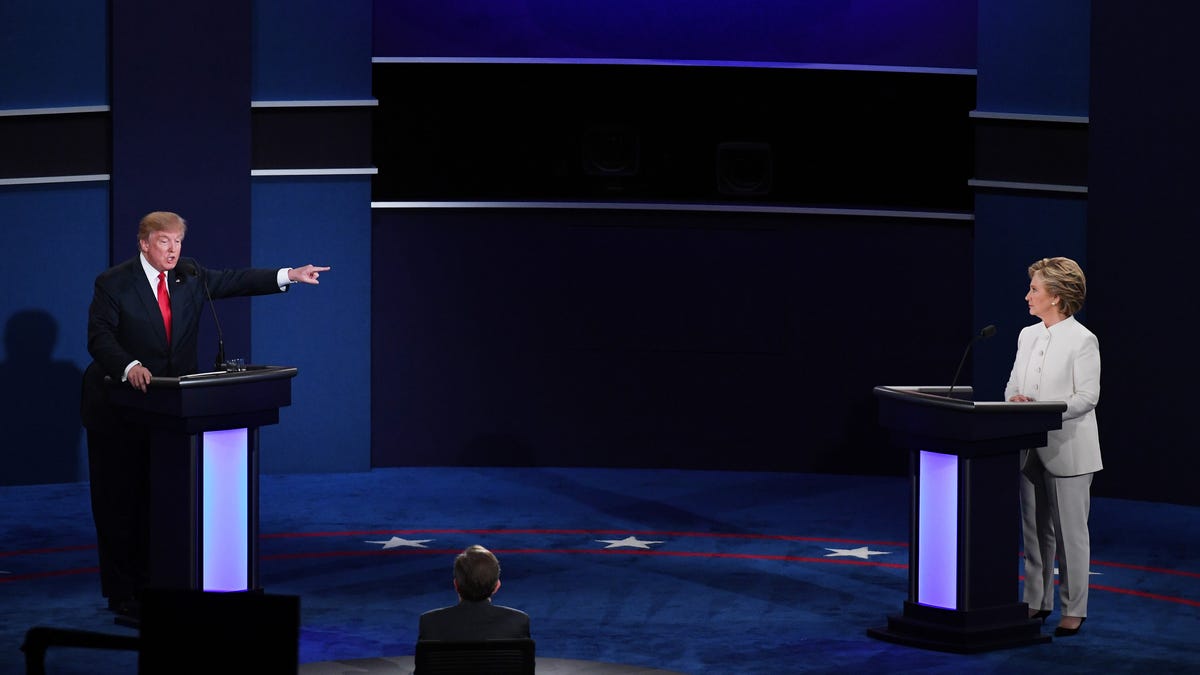Trump, Clinton get ugly in debate; social media is sick of it
The two presidential candidates spar over foreign affairs, gun control and other issues in Vegas as social media viewers get set to roll the dice on one of them.

Here's what social media tells us about the final presidential debate: We're sick of politics.
Analysis of social media data pulled before, during and after Wednesday night's showdown between Republican Donald Trump and Democrat Hillary Clinton in Las Vegas yielded dismal, if predictable, results. Neither candidate inspires the electorate, at least in the social media landscape.
But Trump inspired voters least, according to Brandwatch, a company that analyzes social media activity.
The real estate mogul generated negative sentiment 62.4 percent of his Twitter mentions, Brandwatch said. Clinton, meantime, generated positive sentiment 53.8 percent of the time.
Clinton's performance with social media users marked a milestone in what has proved to be an ugly election campaign; the social media response was the first time either candidate generated positive sentiment in any of the debates.
Brandwatch analyst Kellan Terry said an exchange of one-liners hurt Trump and helped Clinton. Trump's called Clinton "such a nasty woman," while Clinton called Trump a puppet of Russia. This led to the #ImWithHer, Clinton's support hashtag being used about 1.2 million times, according to social media analysis group Talkwalker.
In an exchange on immigration, Trump said, "We have some bad hombres here," generating both tweets and memes.
"Clinton's balance of substance and reactive statements to Trump's responses was a clear formula for her positive conversation," Terry said.
Social media sentiment, which broadly refers to how viewers respond to the debate, was negative in the first two debates, with both candidates receiving nearly 60 percent negative sentiment, Brandwatch said.
The third debate, however, was tamer as Clinton generated positive overall sentiment, said William Stodden, a political science professor at North Dakota State College of Science and Concordia College in Minnesota. He said the second debate was particularly unpleasant.
"This [debate] was a lot more similar to the first debate," Stodden said."But it was a great spectacle."
Despite generating negative sentiment, Trump commanded social media. And, according to Talkwalker and Spredfast, he was the target of many including comedians Bill Maher and Sarah Silverman.
Moments after the debate Trump grabbed 59 percent of the overall Twitter conversation to Clinton's 41 percent, according to internal Twitter data shared from its @Gov account. On Facebook, Trump also generated more conversation with 56 percent compared to Clinton's 44 percent.
Clinton's twitter handle, however, added more followers during the debate, gaining 13,000 followers, more than double @realDonaldTrump's 6,000 new followers. The most-Tweeted policy issues to viewers in order of importance were foreign affairs, the economy, abortion rights, terrorism and immigration.
Clinton attacked Trump on his treatment of women, generating the the most Tweeted moment of the night.
Social media user sentiment has tracked negative for both candidates in the week prior to the debate, according to the Election Tracker, a social media monitoring microsite developed by enterprise information management company OpenText. The Election Tracker pulls data and contrasts Twitter data related to how social media users feel about campaign issues.
The week prior to the debate, positive social sentiment about both candidates was low. Clinton toward Clinton stood at just 15.19 percent positive association on Twitter, while Trump got just 10.3 percent.
Still, over 15 million people discussed the debate, according to Affinio, a data analysis platform that uses information from Twitter's API.
Twitter said the top tweeted debate moments Wednesday were Trump and Clinton discussing the treatment of women, Trump's refusal to say whether he would accept the election results, Russia, nuclear weapons and the aforementioned "puppet" comment.
The most retweeted exchange wasn't Trump saying "I'll keep you in suspense" when he refused to say if he would accept the election result in three weeks' time, according to Spredfast. Clinton called his response, "Horrifying."
Instead, the most retweeted tweet was actually this, one Trump originally sent on Jun 18, 2013, where he asked if Putin would be his "new best friend" if he attended the Miss Universe Pageant:
Another popular retweet was a scathing tweet from former Democratic presidential nominee Bernie Sanders calling Trump the "least qualified" candidate which had a combined 36,000 retweets and likes.



